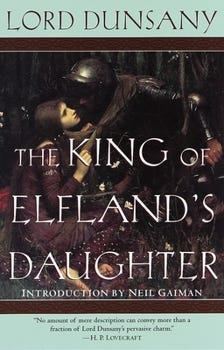Book Recommendation: The King of Elfland's Daughter by Lord Dunsany
A classic that should be on more "classics" lists.
There are some books that I hesitate to recommend because they are my absolute favorite books. That might sound odd. Shouldn’t you want to recommend your favorite books? You should. But my favorite books are the ones that profoundly impacted me in some way. I’m reminded of the old Jim Gaffigan joke: “You ever read a book that changed your life? Me neither.”
And while it’s a funny joke, I cannot relate. There have been books that have profoundly changed my life. And when I share them with others, I dread the follow-up conversation. “So did you read the book?” “Yeah… *sniff* It was all right.” All right. All right?! That’s all you could say about it!?
And I just checked the Amazon page for this book and saw one of the reviews: “Culturally Significant but Not Stirring.” Not stirring. Not stirring!? With that said, I don’t know that I would say The King of Elfland’s Daughter changed my life, but it certainly did stir me and continues to stir me twenty years after I first read it. It fundamentally changed what I thought I knew about what was possible with books and how they can alter your perception about the things you most take for granted.
And even now, I wonder if I should not tame my words a little, because clearly, as Amazon shopper number twelve-million-and-two has demonstrated, your results may vary.
Let’s start with the part of the review I agree with: the book’s cultural significance. If you are into fantasy, and you want to go deeper into the roots of the genre than Lord of the Rings, one of the writers to examine is Lord Dunsany. He wrote mainly in the first half of the twentieth century. His fantasy novels are something of a middle ground between fairy-tale and modern fantasy. There would be no Lord of the Rings, no Dungeons and Dragons, no Game of Thrones, without, in part, Lord Dunsany.
There are a few things I love about The King of Elfland’s Daughter, and they did not come at me all at once. As I’ve aged, the impact of this book has aged with me. And that feels appropriate because a central theme in this book is the passage of time.
The King of Elfland lives in this state of near-unchanging time. He exists in Elfland with his daughter in this perfect moment, frozen. After having kids and watching them grow so fast I understand this desire more than anything. If I could stop time in the loving embrace of my children and hold that moment for eternity, I would. And so the King of Elfland does.
But an adventurer bounds into Elfland and woos and steals the Daughter of the King of Elfland away from her father and his timeless embrace and marries her. The book then becomes a few different stories: The strain on the relationship between the mortal hero, Alveric, and the timeless elf princess, Lirazel, now having to adjust to a world of time and decay, pining for her what she lost in Elfland. Also, the King’s efforts to “rescue” his daughter. And then, after a while, it becomes still something else.
My absolute favorite part is when the King of Elfland sends a troll to Earth to return his daughter, and you see the plain ordinary world of cottages and chickens from the viewpoint of this troll. From the perspective of this troll, the ordinary world is this fascinating, strange, wonderful, mystifying, terrifying place, as Elfland would be to us. And seeing the familiar so described as utterly unfamiliar was an eye-opening experience for me. I wasn’t just seeing something from another person’s perspective, but I was seeing reality itself from a completely alien perspective.
I treasure this book, and I recommend it to anyone, but especially to those who like fantasy but have yet to delve into its rich past. Not only is this book “Culturally Significant” but it also “Stirs.” Indeed does it stir.





